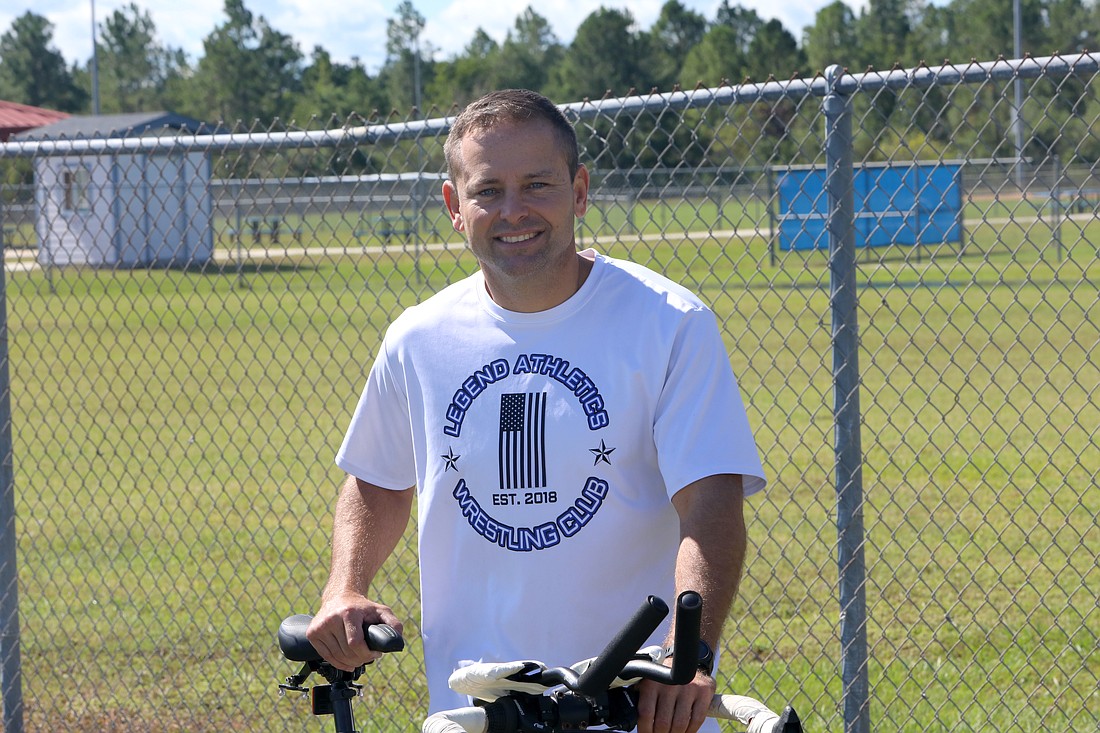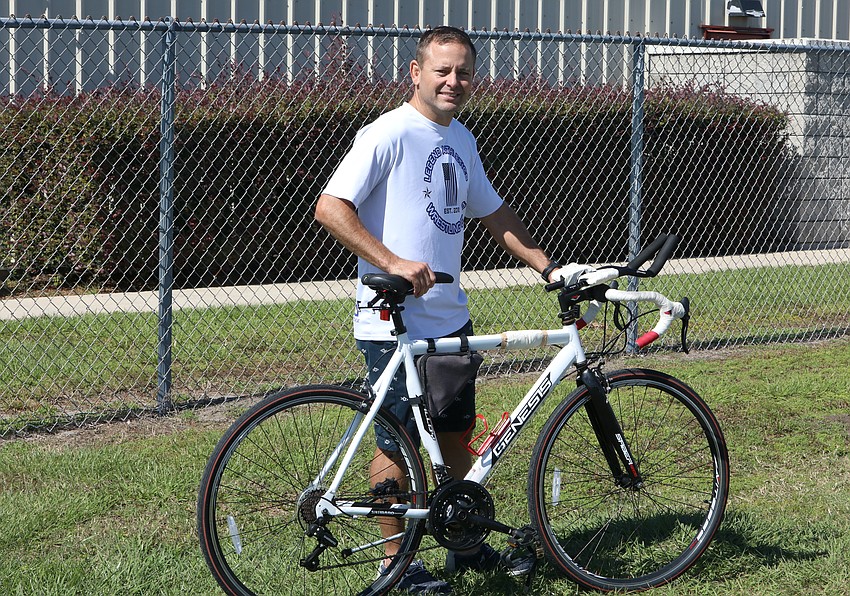- April 5, 2025
Your free article limit has been reached this month.
Subscribe now for unlimited digital access to our award-winning local news.

Jeremiah Marschka would never have been considered a candidate to run an Ironman Triathlon.
Marschka, 41, is an ESE teacher and wrestling coach at Matanzas High School. He is a member of the Army National Guard and he played baseball, football and wrestled at Flagler Palm Coast High School, so he’s no stranger to running. But he’s never run a marathon.
He had never taken long bicycle rides either. “I grew up in the country on dirt roads, so I never had bikes growing up,” he says.
And swimming? “I swam enough to get back in the boat to fish,” he says.
Until this year, that sums up Marschka’s experience in the three grueling disciplines that make up every triathlon. He has been training for the past eight months to swim, bike and run the distance at the Ironman Florida on Nov. 4 in Panama City Beach.
An Ironman is no ordinary triathlon. A sprint triathlon is usually about 16 miles total. An Olympic triathlon is about 32 miles. An ironman is a total of 140.6 miles. The Ironman Florida begins with a 2.4-mile swim consisting of two loops around the Panama City Beach pier followed by a 112-mile bike ride and finishing with a full marathon of 26.2 miles.
Marschka believes in pushing his limits. In July, he stepped into the octagon and fought in a mixed martial arts bout for charity. He has a boxing background, but he has no experience in Brazilian Jiu-Jitsu. He won the bout.
A group of four friends with similar Type A traits convinced Marschka to sign up for the Ironman. The group includes Blake Wall, who grew up with Marschka in Flagler County. Wall now lives in Asheville, North Carolina. The others are friends from the military and college.
This past year and a half the friends were training to run a marathon. But Wall said he’d only run a marathon if it was part of an Ironman. So they called his bluff. They called up Marschka and told him they were signing up for an Ironman.
“I said, ‘You guys are crazy. You’re not going to do an Ironman? And they said, ‘we’re doing it,’ and they signed up,” Marschka says.
When Marschka was younger, he says, he would watch the Ironman World Championship in Hawaii. He admired the athletes’ perserverence.
“It was a huge feat. I thought it was amazing,” he says. “I always wanted to do one.”
So he told his friends, “Let’s do it.”
But Marcshka was not going to put his body through eight months of physical distress simply to check an item off his bucket list. If he was going to do it, he was going to do it for a purpose.
So, for the past eight months, Marschka has been training and raising money for the Flagler County Drug Court Foundation. He regularly broadcasts live on Facebook, sharing stories about his “Ironman Challenge for the FCDC Foundation.”

“I reached out to a friend of mine, Michael Feldbauer, a phenomenal man, who helps organize the Flagler Drug Court Foundation,” Marschka says. “I told him, I want to train. I’ll put the hours in, but I want to be able to use this to raise money for what you guys are doing, and the impact you guys are making and that will just add fire, accountability for myself, to train and make sure I get it completed, because now, I've told people I'm doing it and I’ve asked people to be a part of something. And I wanted to have more impact than me just coming home. I wanted to show my kids. They see the work going in.”
Feldbauer says Marschka’s plans took him by surprise.
“I was extremely happy. I’ve known Jeremiah for a long time,” Feldbauer says. “The desire to help the foundation is every bit as important as every dollar that comes in. We’re a 100% volunteer organization. Telling people about us is increasing knowledge of what we are, letting people know we are the oldest non-profit in Flagler County helping people in recovery since 2009.”
The Flagler County Drug Court provides an avenue for those arrested on a drug-related felony to avoid prison and receive treatment. The Drug Court Foundation fills in the gaps, helping participants attain their GED, provide job training and life skills and help them with things like auto repair.
“We take the burden off their shoulders, so they can concentrate on recovery. And it works,” Feldbauer says.
Through grants the FCDC Foundation has also been providing community education, distributing Narcan, training the Flagler County Health Department how to administer Narcan and convincing the School Board to store Narcan in the schools.
Marschka says his goal is to raise $10,000 for the FCDC Foundation. He tells his followers on Facebook, every little bit helps.
Now, he’s in the final days of his training. He and his friends participated in a half Ironman on Sept. 24 in Augusta, Georgia. Marschka finished the 70.3 miles in six hours and 38 minutes. He was happy with the result. His goal at the Ironman Florida is simply to finish.
I remember the first day I hit 200 yards, non-stop. And I was like, ‘man I'm getting it. I’m figuring it out.’ Now I'll jump in (the pool) and I'll go for an hour, hour and a half, non-stop.” — JEREMIAH MARSCHKA
The hardest part about training, he says is finding the time. He has two young sons, ages 7 and 9. His wife, Brittany, is a sales manager at Daytona Toyota. So, he bought a trainer to turn his bike into a stationary bike, allowing him to train at home in the garage. While his friends were on 100-mile bike rides, Marschka was riding in the garage.
“Even just two and a half hours on the bike, there’s always some meal that you’re missing,” he says.
While many of the Ironman competitors will be riding bikes that cost $10,000 to $20,000, Marschka borrowed a bike from Matanzas wrestling coach Mike Fries.
“I’m mesmerized by some of the bikes out there, but this one’s gong to work,” Marschka says. “It’s a Walmart road bike, to be honest. It’s not the lightest one. But I’ve changed some tires. I made some adjustments as far as putting aero bars on.”
The scariest part was the swim, he says. He started with 50-yard intervals at the Frieda Zamba pool. Now, he’s finding a ryhthm. He did a 1.2-mile river swim at the half Ironman.
“I remember the first day I hit 200 yards, non-stop. And I was like, ‘man I'm getting it. I’m figuring it out.’ Now I'll jump in and I'll go for an hour, hour and a half, non-stop,” he says. “I got to a good point where I’m understanding the breathing pattern. I just was never familiar with it.”
He’s also learned about proper hydration and nutrition.
“Getting nutrients while your training has been a real learning curve,” he says. “I've done some patch tests to see how much sweat I'm losing per hour. So how much salt do I have to be putting back in per hour?”
“I’m not the best swimmer or the best bike rider or the best runner,” he says. “But my best quality is the fact that I won’t quit.”
“I hope he does really well,” Feldbauer says. “I know he’s worked really hard.”
Your free article limit has been reached this month.
Subscribe now for unlimited digital access to our award-winning local news.